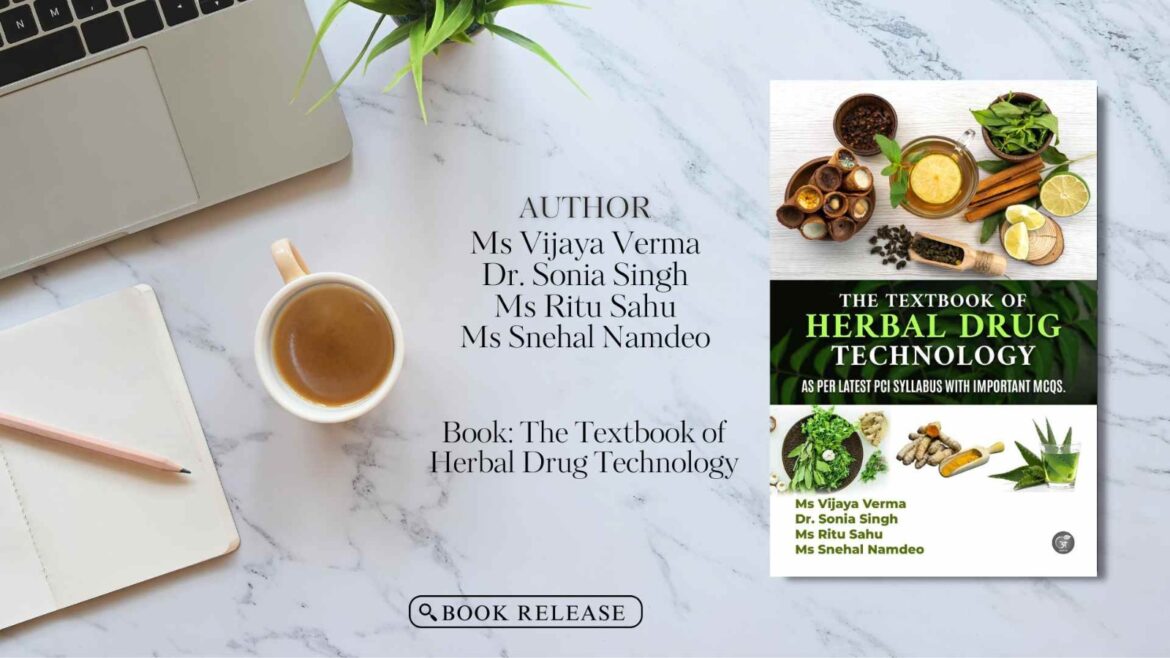The release of The Textbook of Herbal Drug Technology marks a significant step forward for students and educators in the field of pharmaceutical sciences, particularly in the domain of pharmacognosy. Authored by a dedicated team of scholars—Ms. Vijaya Verma, Dr. Sonia Singh, Ms. Ritu Sahu, and Ms. Snehal Namdeo—this book is designed to meet the academic and practical needs of students pursuing pharmacy education in India, especially those aligned with the latest syllabus prescribed by the Pharmacy Council of India.
This textbook provides a comprehensive and structured exploration of herbal drug technology, addressing both foundational principles and advanced topics in a clear and accessible manner. From the classification and identification of medicinal plants to the processes of extraction, standardization, and quality control of herbal drugs, the book serves as a valuable resource for understanding how natural products can be harnessed for therapeutic purposes. In addition to detailed theoretical content, the inclusion of multiple-choice questions (MCQs) makes the book an effective companion for exam preparation, ensuring that students not only understand but also retain key concepts.
One of the key strengths of this textbook is its approachable and engaging writing style. The authors have succeeded in presenting complex scientific concepts in a way that is easy to grasp for undergraduate learners, without compromising on depth or accuracy. Practical examples are interwoven throughout the chapters to reinforce learning, and real-life applications of herbal drug principles are discussed to connect classroom knowledge with field practices.
Each of the four co-authors brings unique expertise and experience to the project, contributing to the richness and credibility of the content. Ms. Vijaya Verma, an Assistant Professor at Apollo College of Pharmacy, Durg, is known for her scholarly contributions in pharmacognosy and her active participation in research and academic seminars. With over 10 published research papers and multiple accolades in oral and e-poster presentations, she offers a strong academic foundation and mentorship experience.
Dr. Sonia Singh, Associate Professor at the same institution, brings over 13 years of teaching and research experience. Having earned her Ph.D. from SRU Raipur, her deep engagement in the study and identification of unknown medicinal drugs enriches the academic fabric of the book. With more than 13 research publications and the guidance of over 60 undergraduate projects, she adds significant value to the text.
Ms. Ritu Sahu, another dedicated professional from Apollo College of Pharmacy, contributes her specialization in the pharmacological potential of medicinal plants and phytochemistry. Her background includes multiple Scopus-indexed publications, book chapters, and a previously published book in pharmacognosy, highlighting her strong presence in the research domain of natural drug discovery.
Ms. Snehal Namdeo, currently a Lecturer at the APJ Institute in Kanker, Chhattisgarh, represents the emerging generation of educators with fresh insights and a strong passion for teaching. With nearly two years of experience and a current postgraduate pursuit in pharmacology, she brings youthful energy and a student-centric perspective to the collaborative effort.
Together, these authors have created a textbook that not only supports the academic success of pharmacy students but also inspires a deeper appreciation for the value of herbal medicines and natural therapeutics. With the global pharmaceutical industry increasingly turning its focus toward plant-based remedies and sustainable drug development, this book arrives at a critical time.
The Textbook of Herbal Drug Technology is more than just an academic resource; it is a reflection of the authors’ commitment to high-quality pharmacy education and research. It is expected to serve as a cornerstone text in colleges and universities across India, equipping the next generation of pharmacists with the knowledge, confidence, and curiosity needed to explore the immense potential of herbal medicine.



